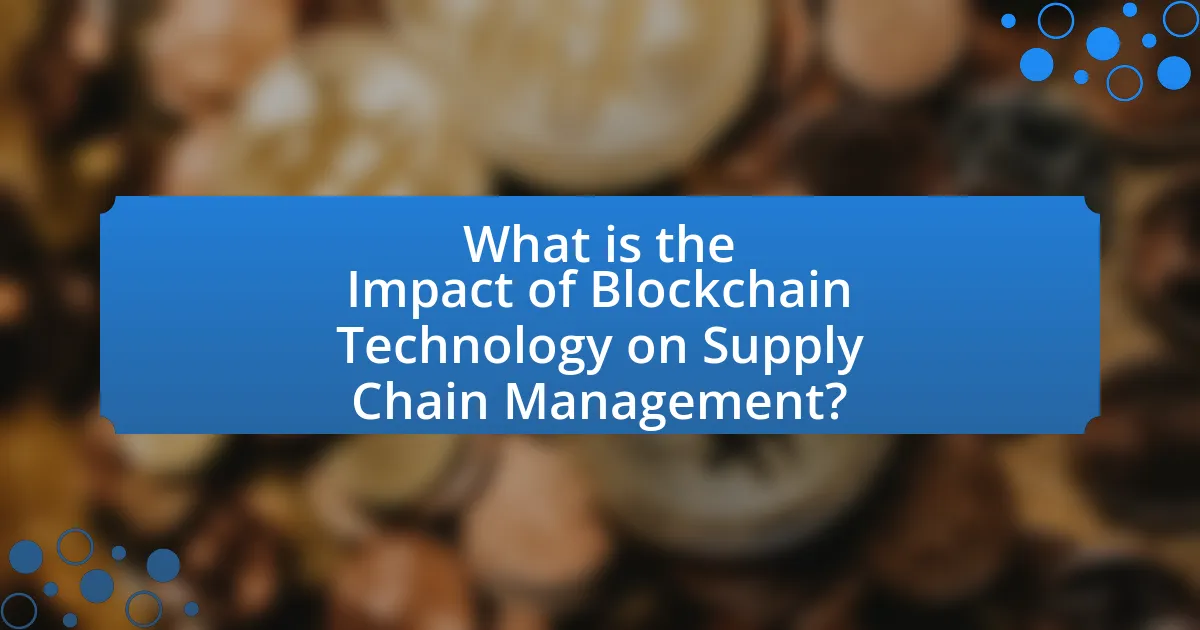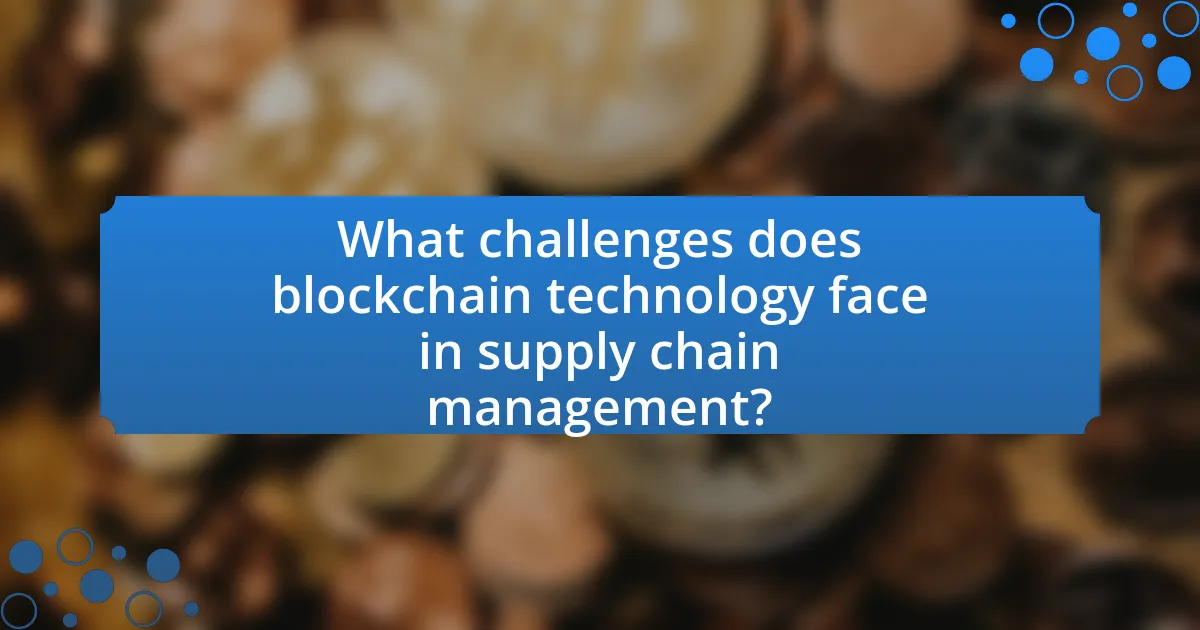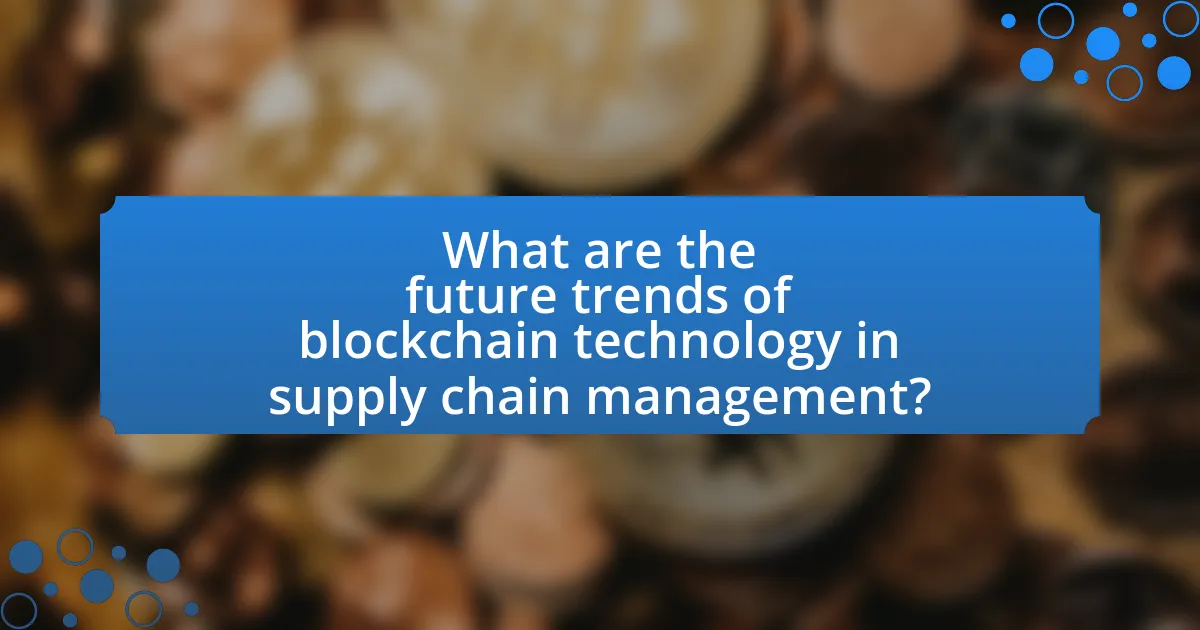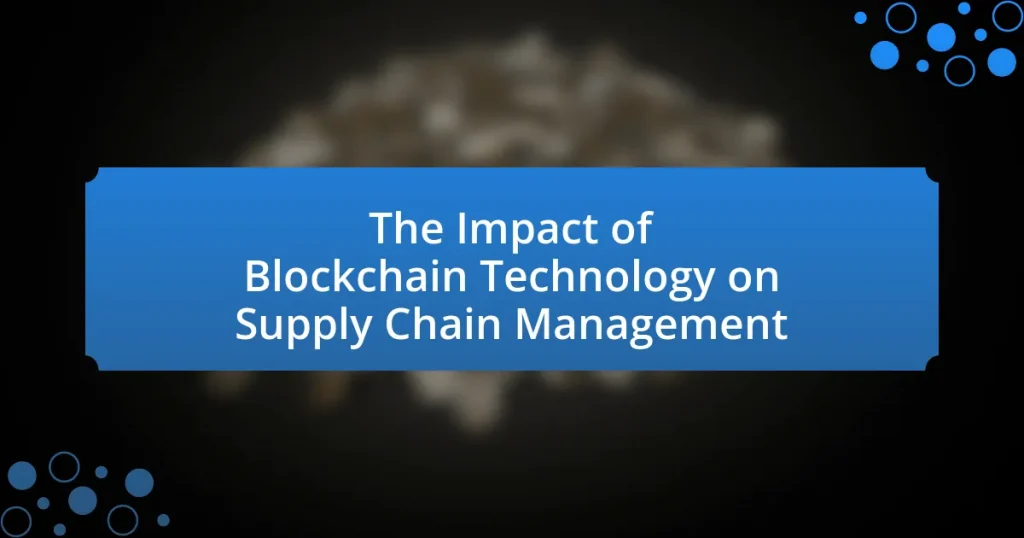The article examines the impact of blockchain technology on supply chain management, highlighting its ability to enhance transparency, traceability, and efficiency. It discusses how blockchain provides a decentralized and immutable ledger that allows all parties in the supply chain to access real-time data, thereby reducing fraud and errors. Key components such as smart contracts, scalability, and regulatory compliance challenges are addressed, along with the potential cost savings and innovations that blockchain can bring to supply chains. The article also explores future trends, including the intersection of artificial intelligence and blockchain, and outlines best practices for successful implementation.

What is the Impact of Blockchain Technology on Supply Chain Management?
Blockchain technology significantly enhances supply chain management by providing transparency, traceability, and efficiency. It allows all parties involved in the supply chain to access a single, immutable ledger that records every transaction, which reduces fraud and errors. For instance, a study by the World Economic Forum indicates that blockchain can reduce supply chain-related costs by up to 20% through improved efficiency and reduced paperwork. Additionally, companies like Walmart have implemented blockchain to track food products, resulting in a reduction of the time taken to trace produce from six days to mere seconds. This capability not only improves food safety but also builds consumer trust.
How does blockchain technology function within supply chains?
Blockchain technology functions within supply chains by providing a decentralized and immutable ledger that enhances transparency, traceability, and security of transactions. Each participant in the supply chain can access real-time data regarding the movement of goods, which reduces fraud and errors. For instance, IBM’s Food Trust blockchain allows stakeholders to trace the origin of food products, ensuring safety and compliance with regulations. This capability is supported by the fact that blockchain can record every transaction in a secure manner, making it easier to audit and verify the authenticity of products throughout the supply chain.
What are the key components of blockchain technology in this context?
The key components of blockchain technology in the context of supply chain management are decentralization, transparency, immutability, and smart contracts. Decentralization allows multiple parties to access and verify the same data without a central authority, enhancing trust among stakeholders. Transparency ensures that all participants can view the transaction history, which helps in tracking products and verifying authenticity. Immutability guarantees that once data is recorded on the blockchain, it cannot be altered or deleted, providing a reliable audit trail. Smart contracts automate processes and enforce agreements between parties, reducing the need for intermediaries and increasing efficiency. These components collectively improve traceability, reduce fraud, and streamline operations in supply chains.
How does blockchain ensure transparency in supply chain processes?
Blockchain ensures transparency in supply chain processes by providing a decentralized and immutable ledger that records every transaction in real-time. This technology allows all participants in the supply chain, including manufacturers, suppliers, and consumers, to access the same information simultaneously, reducing information asymmetry. Each transaction is time-stamped and linked to previous transactions, creating a chronological chain of events that is visible to all authorized parties. According to a study by the World Economic Forum, blockchain can enhance traceability and accountability, as it enables stakeholders to verify the origin and journey of products, thereby increasing trust and reducing fraud.
What are the primary benefits of integrating blockchain in supply chain management?
Integrating blockchain in supply chain management primarily enhances transparency, traceability, and efficiency. Blockchain technology allows all parties in the supply chain to access a single, immutable ledger, which reduces discrepancies and fraud. For instance, a study by the World Economic Forum indicates that blockchain can reduce supply chain costs by up to 20% through improved efficiency and reduced errors. Additionally, it enables real-time tracking of goods, which enhances accountability and helps in quickly identifying issues such as delays or quality concerns. This level of transparency fosters trust among stakeholders, ultimately leading to better collaboration and decision-making.
How does blockchain enhance traceability of products?
Blockchain enhances traceability of products by providing a decentralized and immutable ledger that records every transaction and movement of goods throughout the supply chain. This technology allows all stakeholders, including manufacturers, suppliers, and consumers, to access real-time data about a product’s journey from origin to destination. For instance, a study by Accenture found that blockchain can reduce supply chain fraud by up to 50% by ensuring that all transactions are transparent and verifiable. This level of transparency not only helps in tracking the authenticity of products but also facilitates quicker identification of issues such as recalls or quality control problems, thereby improving overall supply chain efficiency.
What cost savings can be achieved through blockchain implementation?
Blockchain implementation can achieve significant cost savings in supply chain management by reducing transaction costs, minimizing fraud, and enhancing operational efficiency. By utilizing smart contracts, companies can automate processes, which decreases the need for intermediaries and lowers administrative expenses. A study by Accenture found that blockchain could reduce supply chain costs by up to 30% through improved transparency and traceability, leading to fewer disputes and faster resolution times. Additionally, the immutable nature of blockchain helps in preventing fraud, which can save companies substantial amounts in losses associated with counterfeit goods.

What challenges does blockchain technology face in supply chain management?
Blockchain technology faces several challenges in supply chain management, including scalability, interoperability, and regulatory compliance. Scalability issues arise because blockchain networks can struggle to handle large volumes of transactions efficiently, which is critical for extensive supply chains. Interoperability challenges occur as different blockchain systems may not communicate effectively with each other, hindering data sharing across platforms. Additionally, regulatory compliance is a significant concern, as varying laws and regulations across regions can complicate the implementation of blockchain solutions in supply chains. These challenges must be addressed to fully realize the potential benefits of blockchain in enhancing transparency and efficiency in supply chain management.
What are the technical barriers to blockchain adoption in supply chains?
The technical barriers to blockchain adoption in supply chains include scalability issues, interoperability challenges, and data privacy concerns. Scalability is a significant barrier as many blockchain networks struggle to handle high transaction volumes efficiently; for instance, Bitcoin processes about seven transactions per second, while traditional payment systems like Visa can handle over 24,000. Interoperability challenges arise because different blockchain platforms often lack compatibility, making it difficult for organizations to integrate their systems. Additionally, data privacy concerns are prevalent, as blockchain’s transparency can conflict with the need to protect sensitive business information, leading to reluctance in sharing data across the supply chain. These barriers hinder the widespread implementation of blockchain technology in supply chain management.
How does scalability impact the effectiveness of blockchain in supply chains?
Scalability significantly impacts the effectiveness of blockchain in supply chains by determining the system’s ability to handle increasing transaction volumes without compromising performance. A scalable blockchain can process a higher number of transactions per second, which is crucial for supply chains that require real-time data sharing among multiple stakeholders. For instance, Ethereum’s transition to a proof-of-stake consensus mechanism aims to enhance scalability, allowing it to support more extensive supply chain applications. Research indicates that blockchains with higher scalability can reduce transaction costs and improve efficiency, as seen in projects like VeChain, which focuses on supply chain logistics and has demonstrated the ability to handle thousands of transactions daily. Thus, scalability directly influences the operational efficiency and cost-effectiveness of blockchain solutions in supply chain management.
What security concerns are associated with blockchain technology?
Blockchain technology faces several security concerns, including susceptibility to 51% attacks, smart contract vulnerabilities, and privacy issues. A 51% attack occurs when a single entity gains control of the majority of the network’s mining power, allowing it to manipulate transactions and double-spend coins. Additionally, smart contracts, which are self-executing contracts with the terms directly written into code, can contain bugs or vulnerabilities that malicious actors can exploit, leading to financial losses. Privacy concerns arise from the transparent nature of blockchain, where transaction details are visible to all participants, potentially exposing sensitive information. These issues highlight the need for robust security measures in blockchain implementations, especially in critical applications like supply chain management.
How do regulatory frameworks affect blockchain implementation in supply chains?
Regulatory frameworks significantly influence blockchain implementation in supply chains by establishing legal standards and compliance requirements that organizations must adhere to. These frameworks can either facilitate or hinder the adoption of blockchain technology, depending on how they address issues such as data privacy, security, and interoperability. For instance, the European Union’s General Data Protection Regulation (GDPR) imposes strict rules on data handling, which can complicate the use of blockchain’s immutable ledger feature if personal data is involved. Additionally, regulations that promote transparency and traceability, such as the Food Safety Modernization Act in the U.S., can encourage the integration of blockchain to enhance supply chain visibility and accountability. Thus, the alignment of blockchain technology with existing regulatory frameworks is crucial for successful implementation in supply chains.
What are the current regulations governing blockchain use in supply chains?
Current regulations governing blockchain use in supply chains vary by jurisdiction but generally focus on data privacy, security, and transparency. For instance, the European Union’s General Data Protection Regulation (GDPR) imposes strict rules on personal data handling, affecting how blockchain can be utilized in supply chains that involve personal information. Additionally, the U.S. has implemented the Blockchain Promotion Act, which encourages the use of blockchain technology while ensuring compliance with existing laws related to financial transactions and consumer protection. These regulations aim to foster innovation while safeguarding stakeholders’ rights and ensuring accountability in supply chain operations.
How can companies navigate compliance challenges related to blockchain?
Companies can navigate compliance challenges related to blockchain by implementing robust governance frameworks and staying informed about regulatory developments. Establishing clear policies that align with existing laws, such as anti-money laundering (AML) and data protection regulations, is essential for ensuring compliance. For instance, the Financial Action Task Force (FATF) has issued guidelines that require blockchain companies to adhere to AML standards, emphasizing the importance of customer due diligence. Additionally, engaging with legal experts who specialize in blockchain technology can help companies interpret complex regulations and adapt their operations accordingly. Regular audits and compliance assessments further enhance a company’s ability to identify and mitigate risks associated with blockchain implementation.

What are the future trends of blockchain technology in supply chain management?
Future trends of blockchain technology in supply chain management include increased transparency, enhanced traceability, and improved efficiency. As companies adopt blockchain, they will leverage its decentralized nature to provide real-time visibility into supply chain processes, allowing stakeholders to track products from origin to delivery. According to a report by Gartner, 75% of supply chain organizations will invest in blockchain technology by 2025, highlighting the growing recognition of its potential to streamline operations and reduce fraud. Additionally, smart contracts will automate transactions and compliance, further driving efficiency and reducing costs.
How is blockchain expected to evolve in supply chain applications?
Blockchain is expected to evolve in supply chain applications by enhancing transparency, traceability, and efficiency. As organizations increasingly adopt blockchain technology, they will leverage its decentralized nature to create immutable records of transactions, allowing for real-time tracking of goods from origin to destination. This evolution is supported by studies indicating that 70% of supply chain executives believe blockchain will significantly improve supply chain transparency and reduce fraud. Additionally, the integration of smart contracts within blockchain systems is anticipated to automate processes, thereby minimizing delays and errors in transactions.
What innovations are emerging in blockchain technology for supply chains?
Innovations emerging in blockchain technology for supply chains include enhanced traceability, smart contracts, and decentralized finance (DeFi) applications. Enhanced traceability allows stakeholders to track products in real-time, improving transparency and accountability; for instance, companies like IBM and Walmart have implemented blockchain solutions to trace food products from farm to table, reducing food fraud and waste. Smart contracts automate and enforce agreements between parties, streamlining processes and reducing the need for intermediaries; this has been exemplified by projects like VeChain, which facilitate automated supply chain transactions. Additionally, decentralized finance applications are enabling more efficient financing options for supply chain participants, as seen in platforms like OriginTrail, which leverage blockchain to provide liquidity and funding solutions. These innovations collectively enhance efficiency, reduce costs, and improve trust among supply chain partners.
How will artificial intelligence and blockchain intersect in supply chain management?
Artificial intelligence and blockchain will intersect in supply chain management by enhancing transparency, efficiency, and decision-making. AI algorithms can analyze vast amounts of data generated by blockchain transactions, enabling predictive analytics and real-time insights into supply chain operations. For instance, IBM’s Food Trust blockchain utilizes AI to track food products, ensuring safety and quality while optimizing inventory management. This integration allows for improved traceability, reducing fraud and errors, as AI can identify anomalies in the data recorded on the blockchain. The combination of these technologies leads to a more resilient and responsive supply chain, as evidenced by companies like Walmart, which employs both AI and blockchain to streamline its logistics and enhance product traceability.
What best practices should companies follow when implementing blockchain in supply chains?
Companies should follow several best practices when implementing blockchain in supply chains, including defining clear objectives, ensuring stakeholder collaboration, and selecting the appropriate blockchain platform. Clear objectives help align the technology with business goals, while collaboration among stakeholders, such as suppliers and customers, fosters trust and transparency. Choosing the right blockchain platform is crucial, as it should support scalability, security, and interoperability with existing systems. Additionally, companies should prioritize data privacy and compliance with regulations to protect sensitive information and adhere to legal standards. Implementing these practices can enhance efficiency, traceability, and accountability in supply chain operations.
How can organizations assess their readiness for blockchain adoption?
Organizations can assess their readiness for blockchain adoption by conducting a comprehensive evaluation of their current technological infrastructure, business processes, and strategic objectives. This assessment typically involves analyzing existing systems for compatibility with blockchain technology, identifying potential use cases within supply chain management, and evaluating the organization’s overall digital maturity.
For instance, a study by Deloitte in 2020 highlighted that 40% of organizations that adopted blockchain reported improved transparency and traceability in their supply chains, indicating that readiness assessments should focus on these key benefits. Additionally, organizations should engage stakeholders across departments to understand their needs and concerns, ensuring alignment with blockchain’s capabilities. This multi-faceted approach allows organizations to identify gaps and opportunities, ultimately facilitating a smoother transition to blockchain integration.
What strategies can enhance the successful integration of blockchain technology?
To enhance the successful integration of blockchain technology in supply chain management, organizations should adopt a multi-faceted approach that includes stakeholder collaboration, regulatory compliance, and robust infrastructure development. Stakeholder collaboration is crucial as it ensures that all parties involved, including suppliers, manufacturers, and distributors, are aligned on the blockchain’s objectives and functionalities. Research indicates that successful blockchain projects often involve early engagement with all stakeholders to foster trust and transparency.
Regulatory compliance is another essential strategy, as navigating the legal landscape can significantly impact the implementation of blockchain solutions. Organizations must stay informed about relevant regulations and standards to ensure that their blockchain applications meet legal requirements, thereby reducing the risk of future complications.
Additionally, developing a robust technological infrastructure is vital for supporting blockchain integration. This includes investing in necessary hardware, software, and training to ensure that employees are equipped to utilize blockchain technology effectively. A study by the World Economic Forum highlights that companies with strong technological foundations are more likely to successfully implement innovative technologies like blockchain.
By focusing on these strategies—stakeholder collaboration, regulatory compliance, and robust infrastructure—organizations can significantly enhance the successful integration of blockchain technology in supply chain management.


